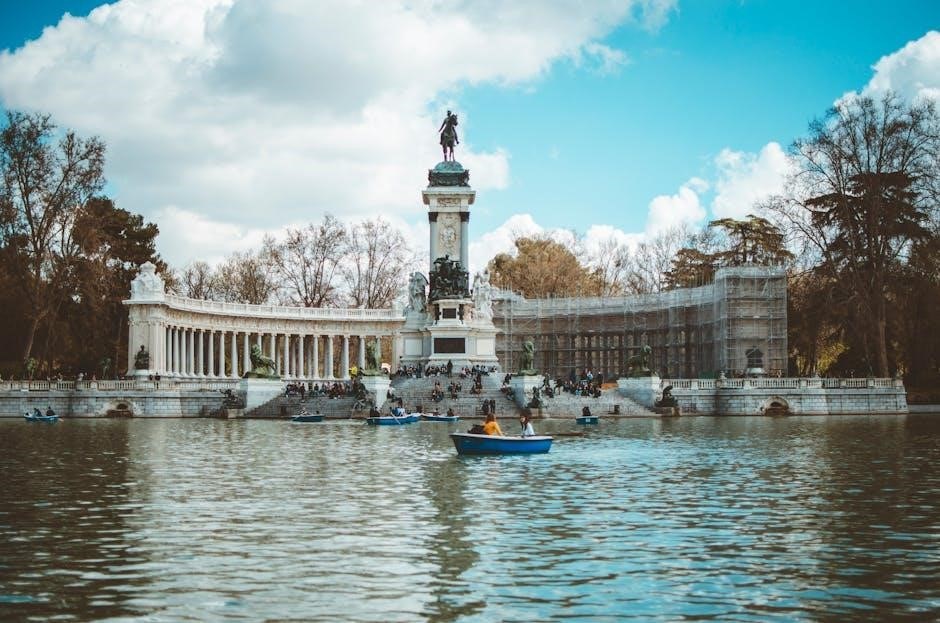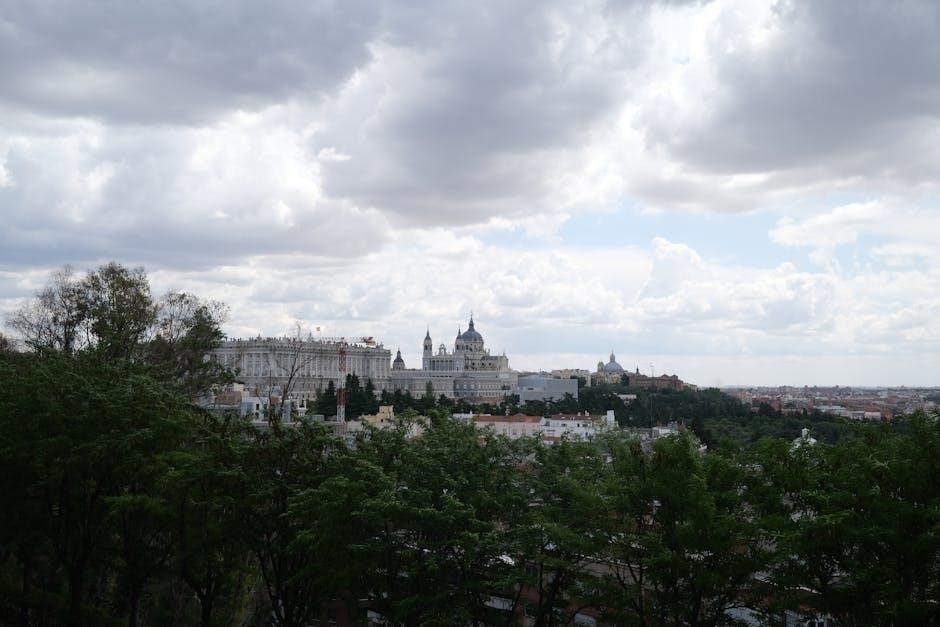spain’s royals were responsible for guiding in

spain’s royals were responsible for guiding in
The Historical Role of Spain’s Royals in Guiding the Nation
The Spanish royals historically guided the nation through unification, cultural consolidation, and the transition from medieval kingdoms to a centralized state, shaping Spain’s identity and political framework.

1.1 The Unification of Spain Under Royal Leadership
The Spanish royals played a pivotal role in unifying the nation through strategic marriages and political alliances; The marriage of Ferdinand and Isabella united the crowns of Aragon and Castile, ending centuries of fragmentation. Their leadership laid the foundation for a centralized state, expelling Muslim rule and fostering a unified Spanish identity that shaped the nation’s future trajectory and cultural heritage.
1.2 The Transition from Authoritarian Rule to Constitutional Monarchy
Spain’s royals guided the nation’s shift from authoritarian rule to a constitutional monarchy, notably under King Juan Carlos I, who facilitated the transition to democracy after Franco’s regime. The 1978 Constitution established the monarch as a unifying figure, ensuring political neutrality and stability. This period marked the monarchy’s adaptation to modern governance, balancing tradition with democratic principles and solidifying its role in Spain’s constitutional framework.

The Current Role of the Spanish Monarchy
The Spanish monarchy currently serves as a symbolic institution, focusing on ceremonial duties, cultural promotion, and charity work, while representing national unity and historical continuity.
2.1 Ceremonial Duties and Cultural Promotion
The Spanish monarchy engages in ceremonial duties, fostering national pride and cultural heritage. Royals promote the arts, sciences, and historical preservation, supporting charities and initiatives that strengthen societal bonds and Spain’s global image.
2.2 Charity Work and Social Initiatives
The Spanish royal family is deeply committed to charity work and social initiatives, supporting education, healthcare, and cultural programs. Princess Leonor actively participates in youth empowerment, while Queen Sofía focuses on social welfare. Their efforts foster unity and improve quality of life, reflecting the monarchy’s dedication to societal progress and humanitarian causes.

The Royal Family’s Influence on Spanish Identity
The Spanish monarchy symbolizes national unity and continuity, reflecting the country’s rich heritage and cultural identity through centuries of historical leadership and symbolic representation.
3.1 The Symbol of National Unity and Continuity
The Spanish monarchy embodies national unity and continuity, serving as a enduring symbol of Spain’s collective identity. Historically, the royal family has been a unifying force, bridging diverse regions and cultures. From the marriage of Ferdinand and Isabella to modern times, the monarchy has represented stability and continuity, reflecting Spain’s shared heritage and its evolution over centuries.
3.2 The Role of the Monarchy in Shaping Spanish Heritage
The Spanish monarchy has deeply influenced the nation’s heritage, fostering cultural identity through historical events and traditions. Royal patronage supported arts, architecture, and preservation of landmarks like Aranjuez. The monarchy’s role in unifying medieval kingdoms and expelling Muslim rule laid the foundation for Spain’s distinct heritage, symbolizing its historical journey and connecting modern Spain to its rich, shared past.

The Constitutional Role of the Spanish Monarchy
The Spanish monarch serves as the nation’s symbol and head of state, with duties including promoting international relations and ensuring political neutrality, as outlined in the Constitution.
4.1 The Monarch as Head of State
The Spanish monarch, as head of state, embodies national unity and continuity, serving as a symbol of the Spanish nation. The Constitution assigns the monarch duties such as appointing the Prime Minister, promulgating laws, and representing Spain internationally. While holding no executive power, the monarch plays a unifying role, bridging past and present, and ensuring political stability in a neutral and apolitical capacity.
4.2 Promoting Relations with Spanish-Speaking Countries
The Spanish monarchy plays a pivotal role in fostering diplomatic and cultural ties with Spanish-speaking nations. The monarch engages in state visits, promoting economic collaboration and cultural exchange. This role strengthens Spain’s global influence and reinforces its historical bonds with Latin America. Princess Leonor’s recent visit to New York exemplifies this effort, showcasing Spain’s commitment to international cooperation and cultural heritage.
The Education and Preparation of Royal Heirs
Princess Leonor’s education emphasizes leadership, cultural heritage, and modern governance, preparing her to guide Spain’s monarchy into the future while honoring its traditions and legacy.
5.1 Princess Leonor’s Role in Modernizing the Monarchy
Princess Leonor, the future queen, is being groomed to lead the monarchy into the 21st century. Her education focuses on leadership, cultural heritage, and global affairs, preparing her to navigate modern challenges. By engaging in public duties and embracing innovation, Leonor aims to bridge tradition with contemporary values, ensuring the monarchy remains relevant and connected to Spanish society and its global community.
5.2 The Significance of Royal Education in Maintaining Tradition
Royal education plays a vital role in preserving the monarchy’s traditions and cultural legacy. Princess Leonor’s studies emphasize leadership, history, and diplomacy, ensuring she understands Spain’s heritage. By combining modern skills with historical knowledge, her education prepares her to uphold the monarchy’s constitutional role while adapting to contemporary demands, maintaining the balance between tradition and progress. This ensures continuity in the monarchy’s enduring legacy.
The Spanish Royals and Cultural Promotion
Spain’s Royals have long championed cultural enrichment through royal patronage of the arts, education, and heritage preservation. Their support for historical sites and institutions fosters national pride and unity, while Princess Leonor’s initiatives promote modern cultural exchange, ensuring the monarchy’s active role in preserving and advancing Spain’s rich cultural legacy.
6.1 Royal Patronage of the Arts and Sciences
Spain’s Royals have historically supported the arts and sciences, fostering cultural and intellectual growth. Royal patronage has sponsored renowned institutions, preserved historical sites, and promoted education. Princess Leonor’s academic pursuits reflect this legacy, emphasizing the monarchy’s enduring commitment to advancing Spain’s cultural and scientific heritage, ensuring its relevance in modern society while honoring traditional contributions to the nation’s identity and global influence.
6.2 The Royal Family’s Support for Historical Preservation
The Spanish Royal Family has been instrumental in preserving the nation’s historical heritage. Royal estates like Aranjuez and cultural initiatives highlight their commitment to safeguarding Spain’s architectural and historical legacy. Their efforts ensure the nation’s rich history remains accessible, fostering a sense of national identity and continuity, while also promoting cultural tourism and education, vital for Spain’s heritage and global recognition.
Controversies and Challenges Faced by the Spanish Monarchy
The Spanish monarchy has faced scandals, public perception issues, and challenges adapting to modern society, testing its relevance and prompting debates about its role in contemporary Spain.
7.1 Scandals and Public Perception
The Spanish monarchy has faced numerous scandals, including financial controversies and questionable associations, leading to a decline in public trust. King Juan Carlos’s past actions and Princess Corinna’s unclear role have sparked criticism. These incidents have prompted debates about the monarchy’s transparency and relevance, impacting its public image and challenging its traditional role in Spanish society.
7.2 The Monarchy’s Efforts to Adapt to Modern Society
The Spanish monarchy has sought to modernize by embracing transparency and accountability, distancing itself from past controversies. King Felipe VI has emphasized a more austere and professional image, while Princess Leonor’s education reflects a commitment to preparing future rulers for contemporary societal demands, ensuring the monarchy remains relevant in a changing political and cultural landscape.

The Global Influence of Spain’s Royals
Spain’s royals have fostered global connections through cultural exchanges, diplomatic visits, and initiatives, strengthening ties with Spanish-speaking nations and promoting Spanish heritage worldwide.

8.1 Princess Leonor’s Visit to New York and Its Impact
Princess Leonor’s visit to New York highlighted her role as a future monarch, showcasing Spain’s cultural heritage and fostering international relations. Her presence emphasized the monarchy’s modernizing efforts, connecting with global audiences and reinforcing Spain’s influence on the world stage through diplomacy and cultural exchange.
8.2 International Recognition of Spanish Royal Initiatives
Spanish royal initiatives have garnered global acclaim, particularly in cultural preservation and education. The monarchy’s support for historical heritage and linguistic exchanges has strengthened ties with Spanish-speaking nations. Princess Leonor’s studies and public engagements, alongside awards for cultural research, highlight the monarchy’s commitment to fostering international understanding and promoting Spain’s rich identity on the world stage.
The Future of the Spanish Monarchy
The Spanish monarchy must adapt to modern societal values while preserving its historical significance, ensuring its relevance in a evolving democratic framework for future generations.
9.1 Ensuring Relevance in a Modern Democratic Society
The Spanish monarchy must evolve to remain relevant, embracing transparency and adaptability. By engaging with societal changes and fostering public trust, the royal family can maintain its symbolic role while aligning with contemporary values, ensuring its endurance in a democratic framework that values tradition and progress equally.
9.2 The Role of Young Royals in Shaping the Monarchy’s Future
Young royals, such as Princess Leonor, are pivotal in modernizing the monarchy. Her education and public engagements highlight a commitment to duty and cultural promotion, ensuring continuity while embracing contemporary values. By preparing the next generation to lead, the Spanish royal family secures its relevance, blending tradition with innovation to meet the expectations of a modern society.
The Legacy of Spain’s Royals in Guiding the Nation
The Spanish monarchy’s legacy is marked by its enduring impact on national unity, cultural identity, and historical continuity, shaping Spain’s journey from medieval kingdoms to modern statehood.
10.1 Historical Achievements and Their Lasting Impact
The Spanish royals played a pivotal role in unifying the nation, fostering cultural identity, and transitioning from medieval fragmentation to a centralized state, leaving a lasting legacy in Spain’s development and heritage.
10.2 The Enduring Symbolism of the Spanish Monarchy
The Spanish monarchy embodies national unity and historical continuity, symbolizing the country’s rich heritage and shared identity. Through cultural promotion and preservation, the royal family has maintained a strong connection to Spain’s past while adapting to modern society, ensuring their enduring relevance as a unifying force for the nation.
The Spanish monarchy’s enduring legacy underscores its pivotal role in shaping national identity, fostering cultural heritage, and adapting to modern societal demands, ensuring its continued relevance.
11.1 The Ongoing Importance of the Spanish Royal Family
The Spanish royal family remains a vital symbol of national unity and cultural identity, embodying historical continuity while adapting to modern societal expectations. Princess Leonor’s education and public engagements highlight the monarchy’s commitment to evolving traditions. By balancing ceremonial duties with contemporary social initiatives, the royal family continues to foster a sense of shared heritage and national pride, ensuring its relevance in a democratic Spain.
11.2 The Balance Between Tradition and Modernity
The Spanish royal family successfully navigates the balance between preserving historical traditions and embracing modernity. Princess Leonor’s education and public engagements exemplify this blend, ensuring the monarchy’s relevance in contemporary society. By upholding centuries-old customs while adapting to societal changes, the royal family maintains its cultural legacy and connection to the nation’s heritage, securing its enduring role in Spain’s evolving identity.